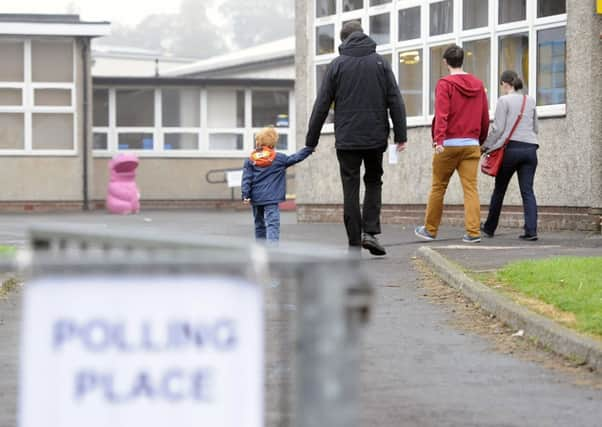VIDEO - Scottish Independence: Day of destiny


The future of Scotland and that of the 307-year-old United Kingdom will be determined by an unprecedented turnout of voters from Shetland to the Borders.
With last night’s polls indicating that the result is too close to call, the fate of the nation lies in the hands of 4,285,323 people – 97 per cent of the potential electorate – who have registered to vote.
Advertisement
Hide AdAdvertisement
Hide AdVoters can cast their ballot at 5,579 polling stations from 7am until the polls close at 10pm. The question: “Should Scotland be an independent country?” requires a straight Yes or No answer.
Turnout is expected to top 80 per cent, making today the busiest day in Scottish electoral history.
Last night both sides continued to make impassioned pleas for support as the ever-tightening opinion polls suggested that the referendum battle will go right down to the wire.
Advertisement
Hide AdAdvertisement
Hide AdA survey by Ipsos-Mori detected a big surge to Yes, putting support for independence on 49 per cent against 51 per cent for No when “undecideds” were excluded.
The poll of 1,405 people on Monday and Tuesday of this week for STV represented a seven-point rise in support for Yes and a seven-point drop in backing for No since last month.
When those who have still to decide how to vote were included, the survey indicated that the No campaign was on 49 per cent, Yes was on 47 per cent and 5 per cent did not know.
Another opinion poll released last night by Panelbase also indicated that the race is incredibly finely balanced.
Advertisement
Hide AdAdvertisement
Hide AdIt found No narrowly ahead of Yes by 52 per cent to 48 per cent when “don’t knows” were removed. When the “undecideds” were included, it found that 50 per cent were for No, versus 45 per cent for Yes with 5 per cent yet to make up their minds.
Yes Scotland said the polls were “hugely encouraging” and suggested the campaign led by Alex Salmond was within “touching distance of success”.
Last night, Mr Salmond spent the last hours before the vote – for which he has worked his entire political life – making a speech in front of 1,600 Yes activists at Perth Concert Hall.
Mr Salmond said the Yes campaign had been the “greatest in Scottish history” as he urged voters to leave their “mark in the pages of history” by voting for independence. He was speaking at the end of a full day of campaigning which saw him start out at an engineering works in Stewarton, Ayrshire, before taking to his helicopter and travelling to Perth via Edinburgh.
Advertisement
Hide AdAdvertisement
Hide AdYes campaigners took to the streets and doorsteps again yesterday in the belief that the huge number of registered voters gives them a chance of reaching the finishing line first when the votes are finally counted in the early hours of tomorrow morning.
Mr Salmond believes that if Yes Scotland can persuade those who have felt disenfranchised until now of his case, independence is in his grasp.
That belief was felt on Buchanan Street in Glasgow, where 200 Yes supporters gathered to hear speeches from the actress Elaine C Smith and the Yes Scotland chairman Dennis Canavan.
Around the same time, Better Together held a rousing rally in Glasgow that saw former prime minister Gordon Brown deliver a passionate speech in defence of the Union. Mr Brown attacked the Yes campaign, saying: “To those that think Scotland will be somehow more progressive under the nationalists, let us tell them of our vision for the future of Scotland.
Advertisement
Hide AdAdvertisement
Hide Ad“Not the Scotland of insults, abuse, threats and recriminations. It is the Scotland of Adam Smith and John Smith, the Scotland of stability and compassion, the Scotland of comradeship and community. . . bigger and better than what we have seen.”
Mr Brown, who has been instrumental in setting out a timetable for new powers for Holyrood in the event of a No vote, also returned to the campaign’s tactic of attacking Mr Salmond’s economic policy.
Labour strategists were last night confident that their vote was holding up, despite the narrowing polls suggesting that their traditional supporters have been moving to Yes.
Better Together’s last full day of campaigning was signed off by the UK Labour leader Ed Miliband, who made a speech to voters at Edinburgh’s Festival Theatre. As the campaigning drew to a close, the theme of reconciliation was at the heart of a statement issued by the Rt Rev John Chalmers, the Moderator of the General Assembly of the Church of Scotland.
That message was mirrored by a service for unity outside Holyrood. People of all denominations met at a gathering organised by Parliamentary Prayer Scotland to pray for the country to come together.